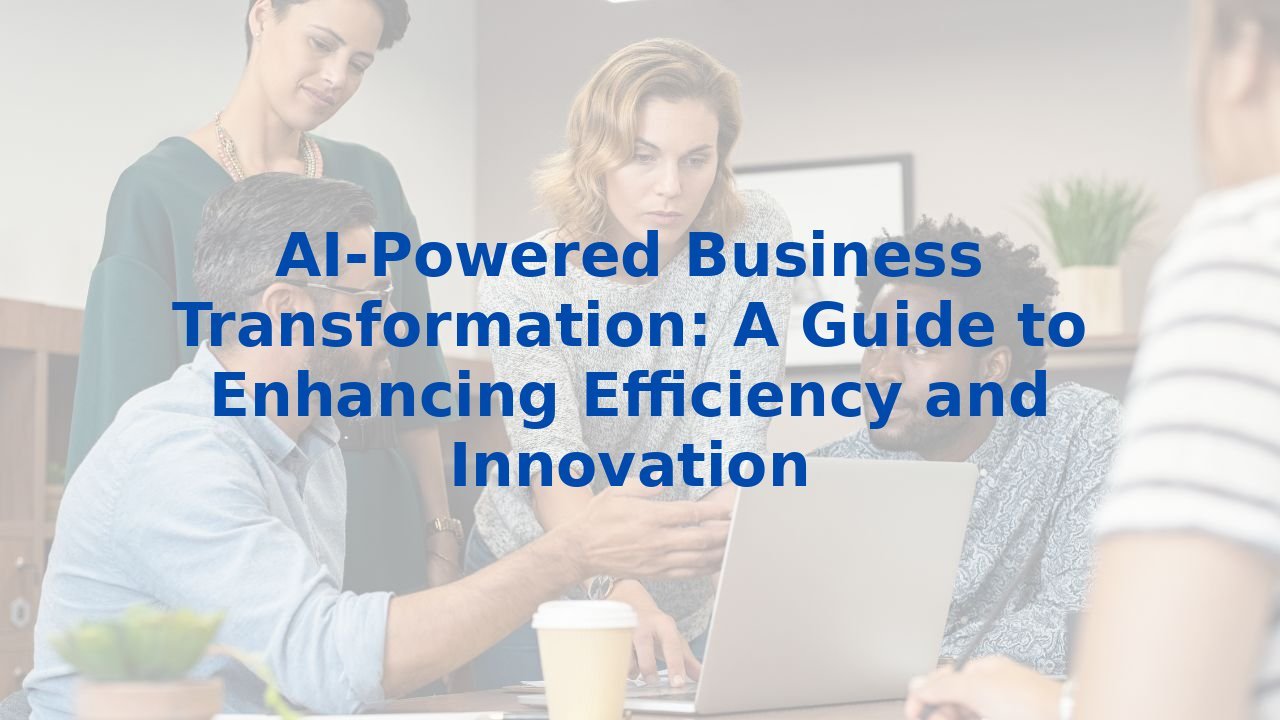AI-Powered Business Transformation: A Guide to Enhancing Efficiency and Innovation
AI-Powered Business Transformation: A Guide to Enhancing Efficiency and Innovation
Introduction
In a world where the pace of change is relentless, organizations are in a constant race to elevate their efficiency and gain a competitive edge. Enter Artificial Intelligence (AI)—a transformative tool that has the potential to not only improve operational processes but also redefine how businesses approach innovation. Leveraging AI can automate tedious tasks, enhance decision-making, and optimize workflows, creating an ecosystem where efficiency thrives. This guide will navigate through the different ways AI can enhance business processes, emphasizing the manifold benefits it brings to organizations.
1. Automating Routine Tasks
Imagine a workspace where tedious, repetitive tasks fade into the background, allowing teams to focus on higher-level initiatives. AI enables this by automating those routine processes. For example, in sectors like finance or healthcare, AI can dramatically cut down on manual data entry through document processing, allowing for swift and accurate information extraction. By alleviating employees of monotonous tasks, not only do we foster a more engaged workforce, but we also minimize human error, thereby enhancing overall productivity.
2. Improving Decision-Making
The decision-making landscape in business has been revolutionized by AI. Through predictive analytics and data modeling, organizations can uncover insights hidden within their data. Let’s consider a scenario where business analysts deploy predictive models to forecast the impact of pricing strategies on profit margins. With AI's capabilities, these analysts can simulate various scenarios, providing them with a data-driven foundation on which to make informed choices. The result? Better tactical and strategic decisions that align with business goals.
3. Optimizing Business Processes
Optimizing business processes with AI involves using machine learning and data analysis to identify bottlenecks and inefficiencies. Techniques such as process mining tap into system logs to assess performance metrics and pinpoint areas ripe for AI intervention. For instance, if multiple employees are bogged down by the manual entry of purchasing data, AI-driven solutions can streamline this task, allowing the workforce to redirect energy toward more strategic activities.
4. Real-Time Monitoring and Automation
Real-time tracking of processes adds a layer of responsiveness that is indispensable in today's business climate. AI empowers companies to monitor operations continuously, providing a priori insights into workflow statuses. Imagine having the capability to identify and address issues immediately as they arise! Moreover, AI can automate decision-making processes based on predefined rules and trends, drastically reducing the possibility of errors and accelerating operational speed.
5. Enhancing Customer Service
Customer service, often the face of an organization, stands to gain immensely from AI. From chatbots that handle basic inquiries to smart systems that analyze customer feedback, AI embodies the future of customer relations. For example, AI can synthesize essential data from incoming requests and log this information into a ticketing system for efficient human follow-up. This means not only quicker resolutions for customers but also informed insights for teams to improve service quality.
6. Improving Product Development Processes
Innovation is at the heart of product development, and AI is paving the way for it. With technologies like generative design software, organizations can explore a multitude of design possibilities that meet set requirements. This technology minimizes laid-down resources for prototyping designs that may not perform. AI's effectiveness in this area helps streamline product development cycles, fostering creativity while also being mindful of costs.
7. Benefits of Training Employees for AI
While the benefits of AI are vast, they are magnified when employees are prepared to work alongside this technology. Training staff on AI tools ensures they can leverage insights effectively and integrate AI into existing workflows seamlessly. When employees are engaged and educated on AI's capabilities, they can harness its potential to augment their work rather than feel threatened by it. Empowering your workforce through training not only enhances productivity but also builds a culture of innovation.
Conclusion
To wrap it up, AI serves as a powerful ally in driving business transformation by enhancing efficiency, accelerating innovation, and streamlining processes. The journey of harnessing AI's potential will not only result in reduced errors and heightened productivity but also afford organizations a leading edge in their respective industries. By investing in AI and the training of their workforce, businesses are setting the stage for profound enhancements in operational efficiency and innovation. Embrace this transformative journey, and let your organization flourish in the age of AI.



